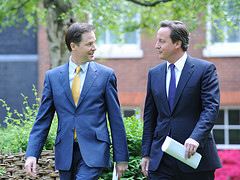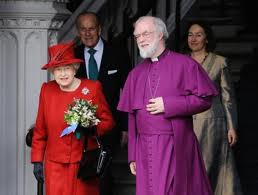
Is the UK Border Agency ‘not fit for purpose’? What purpose exactly?
The Home Affairs Committee has recently published a report into the work of the UK Border Agency in which it criticises the UKBA for failing to deport more than 600 Foreign National Prisoners who were released between 1999 and 2006 and are still in the country. It also says the Agency is failing to clear the ever increasing “controlled archive” of unresolved cases in the Case Resolution Programme. The report calls on for the Home Office to ‘act immediately to deal with the public scepticism in the effectiveness of the UK Border Agency’. Keith Vaz MP (Labour), Chair of the Committee, said: The reputation of the Home Office, and by extension, the UK Government, is being tarnished by the inability …

Choosing an electoral system for the House of Lords
Although their official report isn’t due to be published until the 23rd of April, on Wednesday the Guardian reported that the Joint Committee on Lords Reform has decided to back an ‘open preferential voting system’ rather than the government’s preferred Single Transferable Vote (STV) for electing members to a reformed House of Lords. Open preferential voting is a hybrid electoral system which allows voters to either express a rank ordering of individual candidates in the same manner as STV, or to select a list of candidates chosen by a political party, much like a closed list proportional representation system. In Australia, where the method is used to elect the Senate, this is known as voting ‘below’ and ‘above’ the line …
When is news not news? Donations to political parties and the cash-for-access scandal
Over the weekend the cash-for-access ‘scandal’ over Conservative party donors possibly having dinner with David Cameron in exchange for large donations broke, after a sting by Sunday Times journalists. Predictably the news was followed by ‘outrage’ from the press and the Labour Party over the affront to democracy such donations represented, followed by a statement from David Cameron claiming it had nothing to do with him and that Peter Cruddas was acting independently. Despite the vast amount of news coverage generated by this latest scandal, almost none of it is actually news. Should we be surprised that Party donors get to have dinner with Party leaders? If we are, it is only because of our own ignorance. It says quite explicitly …

Forget the spending row: Nuclear deterrence is cheap at the price
My Oxford colleague Blake Ewing makes an engaging case in favour of the UK pursuing unilateral nuclear disarmament — that is, scrapping the planned replacement programme for the Royal Navy’s Vanguard-class submarines, which currently carry the Trident D5 missile — as a solution to the country’s fiscal travails. Blake and I agree on many things. The folly of cutting the BBC World Service, one of the UK’s unique sources of global influence, is one. The wisdom — or lack thereof — of pursuing or retaining nuclear weapons as a status symbol is another. The merits of avoiding doctoral dissertation work by engaging in procrastinatory blogging would appear to be a third. However, on the question of unilateral disarmament, our advice to …

Looking back at the London Riots — moving from macro to micro analysis
The findings that have recently started to emerge from enquiries into the riots that tore through cities across England in early August 2011 paint a picture of systematic disadvantage, ingrained tensions, and radical disjunction between societal groups. Though it has proved impossible to pin down any single unifying cause for this undercurrent of societal disquiet, there is a strong implication that in the absence of concrete policy proposals to mitigate the riots’ causes and effects similar events are likely to take place again — possibly even in the near future. Though at the moment it is too early to provide much more than a diagnosis of ‘what went wrong’, I believe that the prevailing narratives about the riots have ignored …

What coalition?: Let’s be honest, a Tory-only government would not have done things that differently
On the BBC’s Sunday Politics programme this week, former Defence Secretary and darling of the Tory Right, Liam Fox, suggested that ‘it is a game for academics’ to discern as to whether a Cameron Government policy (i.e. without Liberal Democrat restraint) would be that different from a Coalition Government policy. I reckon it’s not just an ‘academic game’, but nevertheless I’ll give it a go. The central contention here is that a Tory majority Cameron Government would, mutatis mutandis, be no different to today’s Coalition Government in terms of ideology, public policy and behaviour. Some academics agree. Tim Bale and Robin Kolodny observed recently that Britain has a ‘Coalition government but one that, to all intents and purposes, looks, sounds and …

God and politics in the news: even the Queen is speaking out, but the state should tread carefully
This week a British Cabinet minister gave a speech in the Vatican decrying the spectre of militant secularism stalking the nations of Europe and bemoaning the corresponding marginalisation of the faithful. The Queen has also weighed in, speaking at Lambeth Place this week about the benefits of the Church. “We should remind ourselves of the significant position of the Church of England in our nation’s life,” she said. “The concept of our established Church is occasionally misunderstood and, I believe, commonly under-appreciated.” But despite their worry-inspired justifications, these comments, I believe, fall within a broad trend of the reintroduction of faith into the public sphere by British politicians and vociferous cries of persecution from the leaders of faith based organisations. Much of this is …
David Miliband: offering a vision for the future or a defence of the past?
When David Miliband spoke at the Cambridge Union last week, was he espousing a new, more creative foreign policy or did he simply wish to defend the Bush-Blair approach of the preceding decade? David Miliband has become something of a peripatetic political being. For large parts of the parliamentary year he simply disappears and people begin to ask the ‘what’s he up to now?’ question they asked of Gordon Brown. But suddenly, almost ex nihilo, he appears again and begins a flurry of speaking engagements, interviews and articles all to do, supposedly, with a political cause he has aligned himself to. The cause that prompted him to speak at the Cambridge Union and at other universities, for example, was the …









